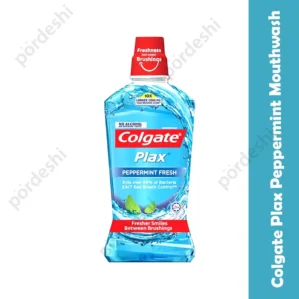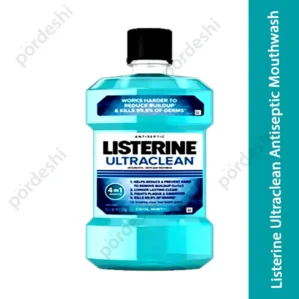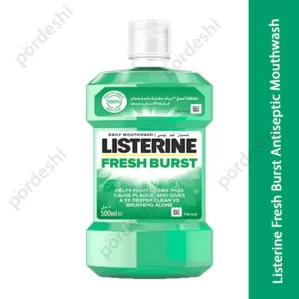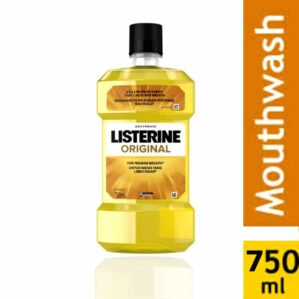Mouthwash
Showing all 5 resultsSorted by latest
Listerine Ultraclean Antiseptic Mouthwash
Original price was: 800.00৳.788.00৳Current price is: 788.00৳.Listerine Fresh Burst Antiseptic Mouthwash
Original price was: 1,100.00৳.980.00৳Current price is: 980.00৳.Listerine Original Antiseptic Mouthwash
Price range: 399.00৳ through 799.00৳The Ultimate Guide to Choosing and Using Mouthwash
Maintaining optimal oral hygiene is crucial for overall health, and one essential tool in your dental care arsenal is mouthwash. Whether you’re a dental hygiene enthusiast or someone looking to enhance their routine, understanding the benefits, types, and best practices for using It can make a significant difference. In this comprehensive guide, we’ll explore everything you need to know about mouthwash, from its various types to the specific ingredients to look for.
What Is Mouthwash?
It is known as mouth rinse or oral rinse, is a liquid product used to enhance oral hygiene. It typically involves holding the liquid in the mouth and swishing it around by using the perioral muscles or moving your head. It may serve various purposes, from reducing microbial load in the mouth to providing analgesic, anti-inflammatory, or anti-fungal actions.
Why Use Mouthwash?
- Reduces Plaque and Gingivitis: Certain mouthwashes contain ingredients that help control and reduce plaque buildup and gingivitis, making them essential for preventive dental care.
- Prevents Tooth Decay: Fluoride-containing mouthwashes help remineralize tooth enamel, reducing the risk of decay.
- Freshens Breath: Cosmetic mouthwashes can temporarily mask bad breath, enhancing social confidence.
- Maintains Oral Moisture: For individuals suffering from xerostomia (dry mouth), saliva-substitute rinses can help keep the mouth moist and neutralize acids.
Who Should Use Mouthwash?
It is suitable for almost everyone but particularly beneficial for:
- Individuals with braces or other orthodontic appliances
- Those prone to cavities and tooth decay
- People suffering from gum diseases like gingivitis
- Individuals with dry mouth conditions
- Anyone looking to maintain fresh breath and good oral hygiene
Types of Mouthwash
Cosmetic Mouthwash
- Purpose: Temporarily controls bad breath and leaves a pleasant taste without eliminating germs.
- Common Ingredients: Flavoring agents, colorants.
Fluoride Mouthwash
- Purpose: Helps rebuild weakened tooth enamel through remineralization, making teeth more resistant to decay and erosion.
- Common Ingredients: Sodium fluoride.
Antiseptic Mouthwash
- Purpose: Kills bacteria responsible for bad breath and plaque.
- Common Ingredients: Chlorhexidine, essential oils like eucalyptus oil.
Whitening Mouthwash
- Purpose: Aids in teeth whitening while maintaining oral health.
- Common Ingredients: Hydrogen peroxide.
Natural Mouthwash
- Purpose: Provides the same benefits as other mouthwashes without synthetic chemicals.
- Common Ingredients: Herbal extracts, essential oils.
Home Remedies for Gingivitis and Other Oral Issues
For those who prefer a chemical-free approach, natural mouthwashes offer the same benefits without synthetic ingredients or alcohol. These mouthwashes are often milder and are ideal for individuals with sensitive gums and those who prefer organic products.
Natural remedies can be an effective way to treat and prevent gingivitis. Here are some methods you can try:
Salt Water Treatment
Salt water is a common and effective home remedy for gingivitis. Simply dissolve a teaspoon of salt in a cup of warm water and rinse your mouth with it. This helps reduce bacteria and soothes inflamed gums.
Mouthwash Options for Treating Gingivitis
Lemongrass Oil Mouthwash
Lemongrass oil has been shown to be effective in reducing plaque and gingivitis. Mix a few drops of lemongrass oil with water and use it as a mouth rinse.
Aloe Vera Mouthwash
Research has found that aloe vera is as effective as chlorhexidine in reducing plaque and gingivitis. Use pure aloe vera juice as a mouthwash to enjoy its benefits.
Tea Tree Oil Mouthwash
Studies have shown that tea tree oil mouthwash is promising for treating gingivitis. Mix a few drops of tea tree oil with water to create a natural one.
Benefits of Using Mouthwash
- Enhanced Oral care: Complements brushing and flossing.
- Improved Breath: Keeps breath fresh throughout the day.
- Gum Health: Reduces inflammation and helps maintain healthy gums.
- Cavity Prevention: Fluoride mouthwashes can aid in preventing cavities.
Dosage and Usage
Follow these steps for effective use of mouthwash:
- Pour the recommended amount (usually specified on the bottle) into a cup.
- Swish the liquid in your mouth for about 30 seconds.
- Do not swallow; spit it out after swishing.
- Avoid eating or drinking for at least 30 minutes post-rinse to allow the active ingredients to work effectively.
Risks and Side Effects
While mouthwash is generally safe, overuse or misuse can lead to:
- Dry Mouth: Excessively using mouthwash can cause a dry mouth.
- Irritation: Ingredients like alcohol can irritate the mouth’s soft tissues.
- Staining: Some antiseptic mouthwashes can cause tooth staining with prolonged use.
Warnings and Safety Advice
- Always follow the instructions on the product label.
- Consult your dentist before starting a new mouthwash if you have existing oral health issues.
- Avoid mouthwashes with high alcohol content if you have sensitive gums or mucous membranes.
How to Choose the Right one:
- Identify Your Needs: Determine if you need a mouthwash for cavity prevention, gum health, breath freshening, or whitening.
- Check Ingredients: Look for active ingredients that match your needs.
- Consider Sensitivity: Opt for alcohol-free or natural mouthwashes if you have sensitive gums.
How We Chose the Best Mouthwash
In selecting the best mouthwashes, we considered:
- Effectiveness: Based on active ingredients and their benefits.
- User Reviews: Real-world experiences and satisfaction levels.
- Expert Recommendations: Input from dental professionals.
- Safety: Products free from harmful chemicals and suitable for daily use.
Ingredients: What to Pay Attention To
Some key ingredients to look for include:
- Cetylpyridinium Chloride: Reduces bad breath.
- Chlorhexidine: Controls plaque and gingivitis.
- Essential Oils: Natural alternatives for antibacterial action.
- Fluoride: Prevents tooth decay.
- Hydrogen Peroxide: Used for teeth whitening.
What Is the Difference Between Various Types?
Understanding the difference between mouthwashes can help you choose the right one:
- Cosmetic vs. Therapeutic: Cosmetic mouthwashes only mask bad breath, while therapeutic ones tackle oral health issues.
- Alcohol vs. Alcohol-Free: Alcohol-based It can be harsh, whereas alcohol-free ones are milder and suitable for sensitive users.
Tips for Using Mouthwash Effectively
- Use it as a supplement to brushing and flossing, not a replacement.
- Stick to the recommended dosage to avoid side effects.
- Choose a mouthwash that suits your specific oral health needs.
Pordeshi Picks: The Best Mouthwashes in Bangladesh
Here are our top picks for the best mouthwashes available in Bangladesh:
- Listerine Total Care Mouthwash: Known for its comprehensive benefits, including cavity prevention and gum health.
- Colgate Plax Peppermint Mouthwash: Offers a refreshing minty flavor while effectively reducing plaque.
- Listerine Ultraclean Antiseptic Mouthwash: Ideal for those with sensitive teeth and gums.
Conclusion
It can be a powerful addition to your oral hygiene routine, offering benefits ranging from fresher breath to healthier gums and teeth. By understanding the different types, ingredients, and best practices, you can make an informed choice that meets your specific needs.
20 Frequently Asked Questions
- Can mouthwash replace brushing and flossing?
No, mouthwash should be used in addition to brushing and flossing, not as a replacement.
- Is it safe to use mouthwash every day?
Yes, most mouthwashes are safe for daily use, but always follow the product’s instructions.
- Can children use it?
Children over the age of six can use it, but always under adult supervision.
- Does mouthwash help with dry mouth?
Yes, there are specific mouthwashes formulated to help with dry mouth.
- Can mouthwash cure bad breath?
It can help manage bad breath, but underlying causes should be addressed with your dentist.
- How long should I swish mouthwash in my mouth?
Generally, you should swish for about 30 seconds.
- Can mouthwash whiten teeth?
Some mouthwashes contain ingredients like hydrogen peroxide that can help whiten teeth.
- Is alcohol-based mouthwash better?
Not necessarily; alcohol-free mouthwashes can be gentler and just as effective.
- Can I eat or drink after using it?
It’s best to wait at least 30 minutes after using it.
- Do I need a prescription for mouthwash?
Most mouthwashes are available over-the-counter, but some therapeutic mouthwashes require a prescription.
- Can mouthwash cause staining?
Some mouthwashes, especially those with chlorhexidine, can cause staining with prolonged use.
- Is natural mouthwash effective?
Yes, natural mouthwashes can be effective and are gentler on the mouth.
- Can mouthwash prevent cavities?
Fluoride-containing mouthwashes can help prevent cavities.
- What is the best mouthwash for gingivitis?
Antiseptic mouthwashes with chlorhexidine or essential oils are effective for gingivitis.
- Can I make my own it?
Yes, homemade mouthwashes with ingredients like saltwater or essential oils can be effective.
- Does mouthwash expire?
Yes, check the expiration date on the bottle and avoid using expired products.
- Can mouthwash help with tooth sensitivity?
Some mouthwashes contain ingredients that can help reduce tooth sensitivity.
- Is it okay to use different types of mouthwash?
Yes, you can use different types depending on your specific needs, but don’t overuse.
- Should I rinse my mouth with water after using it?
No, rinsing with water can reduce the effectiveness of the mouthwash.
- Can mouthwash help with oral thrush?
Certain antifungal mouthwashes can help with oral thrush, but consult your dentist for treatment advice.
By incorporating mouthwash into your daily routine, you can enhance your oral hygiene regimen and enjoy a healthier, fresher smile.



 Hair Care
Hair Care
 Vibrating Rings
Vibrating Rings

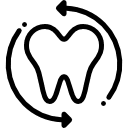 Oral Care
Oral Care
